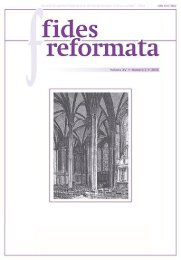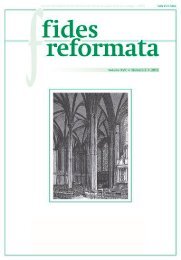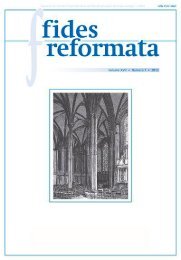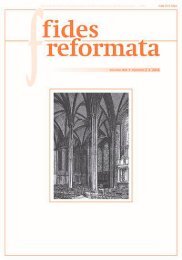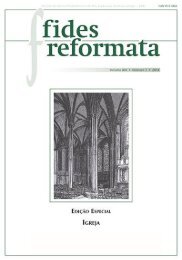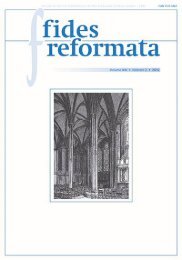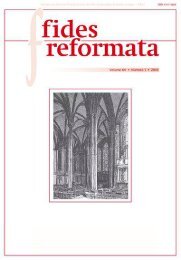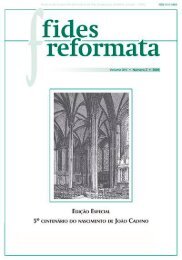Fides 18 N2 - Revista do Centro Presbiteriano Andrew Jumper
Revista Fides Reformata 18 N2 (2013)
Revista Fides Reformata 18 N2 (2013)
You also want an ePaper? Increase the reach of your titles
YUMPU automatically turns print PDFs into web optimized ePapers that Google loves.
FIDES REFORMATA XVIIi, Nº 2 (2013): 99-115<br />
the ground of the righteousness of his obedient heart that expressed itself in<br />
obedient works, Adam was counted as righteous until he fell into sin.<br />
After the fall there was a radical change. By God’s grace, Adam was<br />
again counted as righteous, even though his obedience was now continually<br />
marred by sin. Now he was not reckoned as righteous on the ground of inherent<br />
righteousness, but of imputed righteousness, alien righteousness, righteousness<br />
supplied by God through substitution. The contrast was a stark one, but<br />
it was not as stark as the contrast between human self-righteousness and the<br />
righteousness of God through atonement. This latter contrast is one that can be<br />
characterized as one of works as opposed to faith. Adam’s original obedience,<br />
on the other hand, was not the obedience of works without faith.<br />
Before the fall, righteous Adam lived by faith. His was the obedience of<br />
faith exercised in knowledge, conviction and trust. He knew God and his ways,<br />
was convinced that his promises and gifts were perfect and trustworthy, and<br />
he entrusted himself wholeheartedly to his heavenly Father. Without faith it<br />
is impossible to please the Lord (Heb 11:6). This applied to righteous Adam<br />
before the fall no less than to Adam, in Christ, after his rebellion. Innocent<br />
Adam did nothing in his own strength, nor did he seek to buy God’s favor. He<br />
believingly knew that God already accepted him.<br />
After the fall, man’s justification is grounded on a distinctly different<br />
basis from Adam’s original inherent righteousness, namely, on Jesus Christ<br />
and him crucified, received by faith. This <strong>do</strong>es not mean that the redeemed<br />
only believe and <strong>do</strong> not obey God’s law. One might seek to explain this by<br />
saying that we are justified by faith alone, while we are sanctified by faith<br />
and works. 16 This is, however, a deficient way of expressing the matter. First,<br />
since faith without works is dead (Jas 2:17, 26), it could suggest that we are<br />
justified by dead faith and sanctified by living faith, which would be absurd.<br />
Second, it suggests that the contrast between faith and works is an opposition<br />
of two different functions performed by God’s children. This is not, however,<br />
the concern raised by Paul and the other biblical authors.<br />
When faith and works are contrasted by Paul, he is using shorthand terms.<br />
Faith is faith in Christ and resting in God’s righteousness through him. Works<br />
are works that seek to establish self-righteousness (e.g., Eph 2:8-10; Phil 3:9).<br />
The contrast, then, is between two opposing principles and not between two<br />
functions exercised by the redeemed. Neither our faith function nor our works<br />
save us. Only Christ justifies us. It is the misunderstanding of this point that<br />
16 Cf. the OPC Report on Justification, p. 30, “When Paul speaks in the context of justification,<br />
that is, the irrevocable declaration that one is righteous before God, he invariably establishes the starkest<br />
imaginable contrast between law and works, on the one hand, and grace and faith, on the other. (Though<br />
this is not true when he speaks about sanctification, in which law and works, and grace and faith, are<br />
perfectly complementary, since the good works of the law flow out of the faith that comes by grace).”<br />
111





